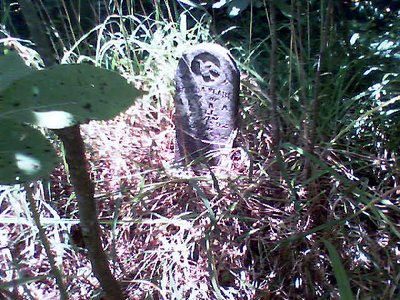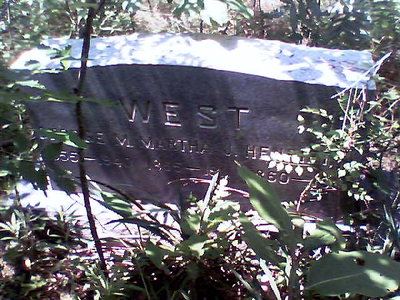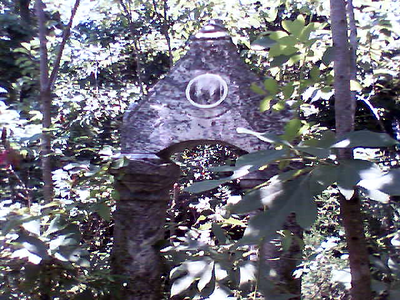Near as anyone can remember, the last person buried at the Ficke Cemetery was carried in there in 1958, the year I was born. I don’t know how many cars, if any, may have been in the procession then but today we take two vehicles out to where my great-great-grandfather, George Marion West (see previous post) lies. My parents lead the way, and my wife and daughters are riding with me.
In many ways it’s a trip back into the past: memories my parents have of coming to this place, memories I myself have of similar trips to other grounds with my grandfather. Fittingly, we start our trip by driving on the old Route 66 before turning off on a succession of county highways named after letters of the alphabet. We pass through small communities such as Japan (pronounced “Jay-pan”) and Strain, before turning onto a smaller road named for what once was the Red Oak community. Red Oak leads to a gravel road, which itself merely covers the original Indian trail that made its way down to the Bourbeuse River. A centuries-old oak tree, deliberately bent so that it grew into a 90-degree trail marker, still points the way.
At a certain point past the marker tree we stop the cars and get out to apply liberal amounts of Deep Woods Off before embarking by foot along a path pressed into the tall grass of a wooded field by a tractor and hay-wagon. Along the way we see through a gap in the trees an almost surrealistic sight of white cattle standing in a flourescent-green pond. “I think this is it,” my father finally says, stepping down into a ditch and then up the bank to lift a single strand of barbed wire.
The woods beyond the wire at this point don’t look noticeably different from everything else that’s around, but we line up single-file to duck under the wire and proceed into the leafy darkness as if on safari. There is no path, and our eyes constantly switch from looking at the person in front, to looking down for a place to put our feet, to looking up again to make sure a branch isn’t snapping back into our faces. There’s supposed to be a cemetery here?
Sure enough, within a few minutes my parents have found a tall, columned monument rising high enough out of the sumac and other weeds and saplings to where it can be more easily seen. Even at that it takes a few moments for its outline to become clear; using the monument as a reference point we begin to see other, smaller shapes emerging from the shadows, brambles and tall grass around us.

Stepping carefully, holding back or pressing down saplings, we all move slowly, sometimes almost losing sight of each other in the foliage. My parents know the general direction to find the stone over great-great-grandpa George and two of his wives. His first wife was a Ficke, which was what brought him back to this place. Her name was Henrietta and she bore him two children before dying from complications from the birth of the second, who turned out to be my great-grandfather, William. She would never know her son, but I would eventually meet him a couple of times (so I’m told) when he was much, much older. George and his second wife, Martha, would have 11 children, but I have to admit to some favoritism for Henrietta, who died young, for bringing William into the world and, hence, my grandfather, my mother, and me.

The single stone for George, Henrietta and Martha is large and relatively easy to spot; other markers are smaller and harder to see. Most difficult to see, and to look at, are tiny headstones for infants and children. We’re here on July 3, and my wife finds a small stone for a child who lived from July 4 to August 3, 1892. Regardless of size, all the stones we come across face to the east, in the direction from which their saviour will return.
It’s a bright, sunny day and very hot, but there’s an eerie quiet and stillness in this place, far away from everything else and virtually untended for who knows how long. There’re probably more than 100 people people buried here. You think about the ghosts that might be lingering, and then you don’t have to just think: you can see them.

Two faces stare out from the white circle, mute witnesses to time passing by.
Looking again at the large monument we first came across we can just make out the faded faces of a husband and wife etched into the upper part of the granite, fading from sight and probably from memory.
Something else is missing. When we find the main gate of the cemetery my mother is certain that there once were large stone columns and an arch marking the entrance. A rusty, metal gate among the briars is all that is there today. Her memory is probably correct, though, and the arch may stand on someone else’s farm or resort today, or rests at Restoration Hardware.
Earlier, on the ride out here, my wife had wondered how many cemeteries there might be in rural Missouri that had disappeared from the memories of those alive today. There’s no answer to that, but I told her that, except for this trip today, the memory of the Ficke Cemetery in my family would have passed with the generation in the car ahead of us. Now, two more generations know of it and have walked (unsteadily) on its grounds. I don’t know what that is worth, or what it will mean, but I think I will be back at least once more.
My father is talking about coming out here again in the fall, after the frost and the cold have made it easier to see the ground. He knows a couple of men with connections to the people buried here and thinks that with light chainsaws and some people to drag the brush away the site can be cleared enough to make it visitable for a few years. I offer to come down early on Thanksgiving week and he thinks that might be a good time to do it. I suppose to some people such a project might appear as useless as leaving a perfectly good stone arch hidden in the woods where no one could appreciate it. Certainly the dead don’t need a fancy portal to their burying grounds, or care if the brush is cut back over them. That doesn’t mean that there isn’t some need or appreciation for these things from the living, however. Something inside me, anyway, says this is just the right thing to do. Moreover, it’s not a chore but something I want to do. Though I have never met anyone buried here, if they hadn’t lived, and met, I wouldn’t be here.
I know only the sketchiest details about the lives of my ancestors and have nothing but my own imagination to picture the lives of the others here, but there’s still a kinship. When we’ve cleared the grounds this fall I’m sure I’ll pause at the end of the day beside a newly visible headstone and, like them, turn my face to the east and think about eternity.
Update:
My earlier musings on Memorial Day and rural Missouri cemeteries can be found here.















